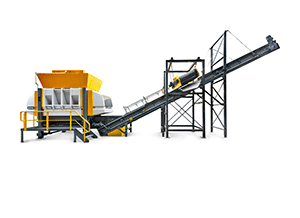The XR-C waste shredder targets the SRF market.
 UNTHA, a recycling equipment company headquartered in Kuchl, Austria, has introduced the new XR-C waste shredder, which has been designed and built to handle solid recovered fuel (SRF) products.
UNTHA, a recycling equipment company headquartered in Kuchl, Austria, has introduced the new XR-C waste shredder, which has been designed and built to handle solid recovered fuel (SRF) products.
UNTHA says its XR Cutter is able to produce a high quality SRF in a single pass, while doubling the output per ton of competing machines. At the same time, the company says that its XR uses 50 percent less power than competitors’ traditional static electro-hydraulic shredders. In contrast to competing mobile diesel shredders, the XR’s power savings can reach up to 220 percent, according to UNTHA.
UNTHA says the savings are achievable because of UNTHA’s new high torque, slow speed eco-drive concept. Modern water-cooled synchronous motors work continuously without overheating, ensuring minimal disruption and highly sought-after uptime. This also keeps operational and maintenance charges at a minimum, with typical wear costs significantly less than €1 (US$1.50) per metric ton.
Peter Streinik, UNTHA’s head of shredding solutions for waste, says, “The beauty of the XR machine is its flexibility. The cutting concept is completely configurable, enabling alternative fuel producers to manufacture an RDF (refuse-derived fuel) with a homogenous, pre-determined particle size of 100 to 400 millimeters, or a precise SRF with a 30 millimeter fraction or less. Load-dependents speed controls also enable the XR’s RPM and torque to be adjusted and optimized, in order to achieve throughputs of up to 70 metric tons per hour. And of course, the fact that the XR provides the most cost-effective way to produce SRF in a single pass is a key selling point.”
Streinik continues, “I think waste-to-energy operators also realize that to truly commit to the global sustainability agenda they should consider the energy efficiency of their WtE plants, not just the renewable nature of their finished product. In doing so, they can transform the profitability of their production systems, while being kinder to the environment.”
UNTHA points out that thanks to significant research, engineering and investments, the company also has been able to manufacture a shredder with improved operational safety features. The shredder has been ergonomically designed to ensure operators can service and maintain the XR quickly, safely and in an upright position. The shredder also operates at less than 70 decibels when empty and less than 80 decibels when processing waste, which means ear protection is not required, the company says.
“This machine was purposefully designed with the customer in mind," says Streinik. "We have worked hard to implement features that will not only benefit the global resource agenda but will, crucially, improve clients’ bottom lines too.”